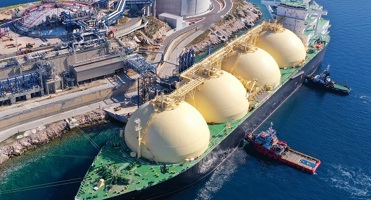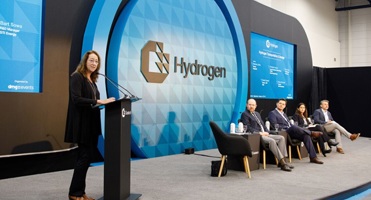The momentum towards achieving the 1.5˚C goal of the Paris Agreement is slowing, casting doubt on our ability to reach global net zero by 2050.
This goal, critical for mitigating the worst impacts of climate change, now appears increasingly out of reach. However, the pursuit of net zero emissions remains essential, and climate technology will play a pivotal role in scaling up efforts to complement existing solutions like renewables, according to global experts who took part in the recent Gastech 2024 Climatetech & AI webinar.
The webinar brought together some of the most influential minds in the field in a virtual event to delve into the cutting-edge developments and opportunities within climate technology. The speakers included Prakash Sharma, Vice President - Scenarios and Technologies at Wood Mackenzie, Jane Stricker, Senior Vice President, Energy Transition and Executive Director at the Houston Energy Transition Initiative (HETI), David Pruner, Executive Director at TEX-E, Taylor Chapman, Principal - New Climate Ventures at Cascade Climate, and Lindsey Entwistle of Wood Mackenzie.
Climatech rankings: a new outlook
The 4th New Technologies Outlook by Wood Mackenzi provides a comprehensive ranking of 243 climate technologies across ten themes based on their development stages and potential impact. This analysis, crucial for understanding the future of our energy transition, evaluates each technology using six metrics: maturity, pace of change, cost of carbon abatement, carbon offset potential, policy support, and dependency.
"The technologies do exist. They are out there. There's almost more than you can count. And the challenge is really prioritizing them and scaling them and allocating the funding where it is most necessary in terms of that enabling infrastructure and first-of-a-kind projects. And given that regulatory certainty which is so critically needed for emerging markets like hydrogen and carbon capture alongside just the funding element," Lindsey Entwistle of Wood Mackenzie, emphasised during her presentation.
Several technologies are on the cusp of global deployment. In transport, this includes passenger and light commercial electric vehicles (EVs), electric buses, and fast charging infrastructure. In power generation, fixed offshore wind and advanced solar cells are leading, while lithium-ion batteries dominate short duration energy storage. Emerging innovations like dynamic line rating (DLR) are poised to enhance grid capacity, reflecting the significant focus on grid edge and end use technologies.
"Grid infrastructure is a critical but underappreciated area for investment. Efficiency gains in AI chips and data centers may mitigate some of the projected demand rise. Hyperscalers and large power buyers are becoming more discerning about their energy sources," Taylor Chapman, Principal - New Climate Ventures at Cascade Climate, said.
High-profile climate technologies: progress and challenges
Progress varies among high-profile climate technologies. Carbon capture is steadily advancing with strong policy support and significant project capacity. In contrast, hydrogen has faced setbacks due to rising costs and execution challenges, though it remains crucial for long-term decarbonization.



























